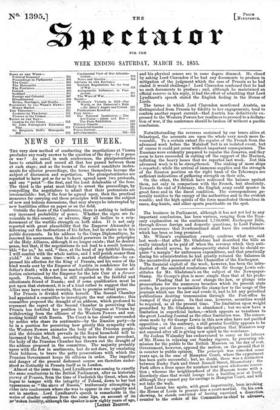NEWS OF THE WEEK.
THE very slow method of conducting the negotiations at Vienna precludes any ready answer to the question of the day—Is it peace or war ? As usual in such conferences, the plenipotentiaries have to establish and record all that has passed between them at each stage ; and as the terms of the record constitute instru- ments for ulterior proceedings, the terms themselves become the subject of discussion and negotiation. The plenipotentiaries are reported to have got so far as to have agreed upon two protocols, and one " point "—the first, and the least debateable of the four. The third is the point most likely to arrest the proceedings, by compelling the negotiators to admit that their pretensions are irreconcilable : but, if the four be agreed upon, then the practical measures for carrying out these principles will become the subject of new and tedious discussions, that may always be interrupted by new hostilities either on paper or on the field. Outside the doors of the Conference, there is nothing to indicate any increased probability of peace. Whether,the signs are fa- vourable to this country, or adverse, they all incline to a rein- forcement of the warlike strength on both. sides. It is not only reported with great plausibility that the Emperor Alexander is f011owing out the instructions of his father, but he states so in his public documents. In his address to the Corps Diplomaticpie, he renewed his assurances, that he should persevere in the principles of the Holy Alliance, although it no longer exists ; that he desired peace, but that, if the negotiations do not lead to a result honour- " for us," he said, " then, at the head of my faithful Russia,
I will combat with the whole nation, and I will perish sooner than yield." At the same time—with a marked distinction—he ex- pressed his affection for the King of Prussia, and his sense of the kind words sent by the Emperor of Austria in condolence for his father's death ; with a not less marked allusion to the sincere af- fection entertained by the Emperor for the late Czar at a former epoch. Prussia, therefore, is still regarded as the faithful and affectionate friend of Russia; and if some qualification must be put upon that statement, it is of a kind rather to suggest that the Allies may have certain recruits, than topromise actual peace.
For Prussia is divided within herself. The Second Chamber
had appointed a committee to investigate the war estimates ; this committee proposed the draught of an address, which professed to represent the regret of the Second Chamber in perceiving that Prussia has forfeited her position in the Congress at Vienna by withdrawing from the alliance of the Western Powers and con- necting he-rifelf with Russia. The. Court is too closely surrounded by nobles who share its sentiments—by the Russian party—to be in a position for perceiving how greatly this sympathy with the Western Powers animates the body of the Prussian people; and the delusion which prevails in the Royal household will be increased by the.fact, that, according to more than one precedent, the body of the Prussian Chamber has thrown out the draught of the address proposed in the committee. The majority probably sgree with the few in sentiments, but do not dare, by emulating their boldness, to brave the 'petty persecutions with which the Prussian Government keeps its citizens in order. The impolioy and danger of the present dishonest course are therefore under- stood as distinctly in Prussia itself as in London..
Almost at the same time, Lord Lyndhurst was coming to exactly
the same conclusions in the British Parliament, after an historical purvey of Prussia, from the time of Frederick the Great, when she began to tamper with the integrity, of Poland, down to her last sppearanoe as the slave of Russia," traitorously attempting to enter into conferences where she was to appear in one capacity and act in another. Lord Lyndhurst's speech is remarkable in the series of similar orations from the same lips, on account of its ur 'woken lucidity, although the speaker is now eighty years of age, and his physical senses are in some degree dimmed. He closed by asking Lord Clarendon if he had any documents to produce in mitigation of the judgment which the ease of Prussia as he had stated it would challenge? Lord Clarendon confessed that he had no such documents to produce ; and, although he maintained an official reserve in his reply, it had the effect of admitting that Lord Lyndhurst's speech stated the English feeling in the House of Lords.
The terms in which Lord Clarendon mentioned Austria, as distinguished from Prussia by fidelity to her engagements, tend to confirm another report current—that Austria has definitively ex- pressed to the Western Powers her readiness to proceed to a declara- tion of war, if the conference should be broken off without a pacific conclusion.


























